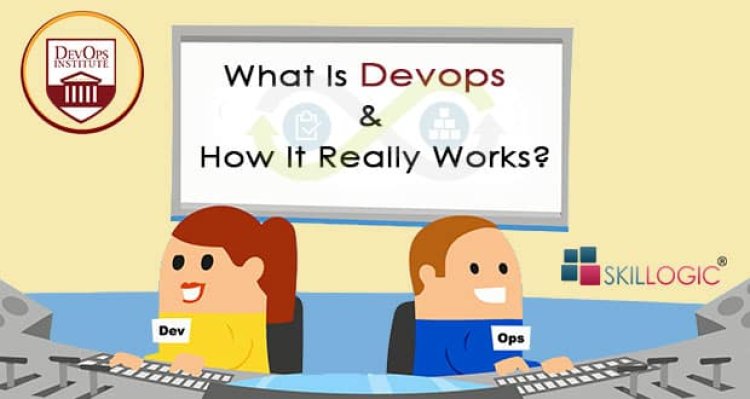What Is DevOps And How It Really Works?
DevOps is a collaborative approach that unifies software development and IT operations to automate and streamline the software delivery process. It enhances efficiency, reliability, and speed through continuous integration, testing, and deployment.

“DevOps” is an emerging model that allows effective collaboration of development and Operations team so that they can build, test, and release software faster and more reliably.
Traditionally in an organization, where a waterfall method is followed in which the development team tests the new code in an isolated development environment for quality assurance. Also, the two teams Operation and Development worked separately. Often, the development team is unaware of the operational roadblocks that might hinder the successful working of the program as anticipated hence it resulted in a delayed deployment in a production environment.
Speaking about DevOps approach, it is actually a merge that is happening between application development and deployment to make it into a streamlined process lining up the efforts of development, quality assurance, and operations team. This very tearing down of silos existing between development and operations, expedite the release of code which in turn help the organization respond quickly to changing business requirements.
Watch video to understand: What is DevOps
How does DevOps work?
Being a set of practices aiming at the unification of development and operations team, DevOps is a cross-functional mode of working. It is essential to understand that there is no such thing as “DevOps Product” but is a delivery model for a set of tools and techniques that facilitates this collaboration.
Continuous Delivery:
Continuous Delivery is a software development practice wherein code changes happens through automation, starting from building it, testing and releasing to production everything is automated. This process appears to be easy when told but not all that easy when applied. Though it seems to be a tough practice, after implementation, developers can expect a deployment-ready build artifact that can be passed through a standardized test process. Hence, it becomes easy to create, test, and deploy applications pretty fast with minimized risks.
Continuous Integration:
Continuous integration is a software development practice in which the code changes are frequently integrated into a central repository, after which automated builds and tests are run. The key element of Continuous integration is identifying the errors quickly and debugging it immediately. This will help in improvement of software quality as well as reduced time frame while validating and releasing new software updates.
Continuous Testing:
Continuous Testing is an important part wherein the process of executing automated tests takes place. Being an essential part of building software solutions, it helps in obtaining continuous feedback on business risks in this built-in latest application. When the testing is happening continuously, the development team can effectively fix the errors on time which prevents the defects getting passed to the next step of software development lifecycle.
Continuous Monitoring:
Continuous Monitoring allows the operation team to monitor constantly to identify and fix the issues which keep the operations smooth. It helps to identify the root cause of issues quickly to proactively prevent outages. As a result of this, a high-quality software that aptly meets customer’s needs is delivered.
Continuous feedback and Optimization:
With the transformation in digital technology, user feedback is crucial for specific applications. When you are able to find out “what your users say and think about your product”, you can work on how to change and improve your product. Hence, with the continuous user reaction measurement, the teams gain a clear approach towards building and providing new application releases directly to lines of business.
DevOps is revolutionizing organizational culture that brings in a much-required change of the software environment. With an ever-increasing number of organizations implementing DevOps, the demand for highly skilled DevOps professionals are also exponentially increasing. It is the right time for you to earn a certification in DevOps to show your expertise. It is essential to choose a training provider who can help you to achieve a thorough knowledge with real-time experience so that you can transform into high skilled DevOps professional in your workplace.
SKILLOGIC® is a Global Authorized Certification center for DevOps licensed under DevOps Institute which is providing classroom training in all major cities in India such as Bangalore, Chennai, Delhi, Hyderabad, Mumbai etc, and Instructed Led Online Training conducted by Certified Industry Best Trainer. They do provide Self Learning options for those interested in doing a self-study. Furthermore, the DevOps courses are designed to cover the set of tools that aid in development and delivery of software with automation. With unlimited exclusive access to DevOps career resources, articles and Job portal, SKILLOGIC® can help you to make a successful transformation into DevOps career.
SKILLOGIC Training Institute is a globally recognized provider of DevOps training and certification. As an authorized partner of the DevOps Institute, SKILLOGIC™ offers expert-led DevOps courses to learners worldwide.
If you are interested in knowing more details about DevOps training, Please visit below pages.
DevOps in Bangalore: https://skillogic.com/devops-training/devops-certification-bangalore/
DevOps in Chennai: https://skillogic.com/devops-training/devops-certification-chennai/
DevOps in Hyderabad: https://skillogic.com/devops-training/devops-certification-hyderabad/

0
50740